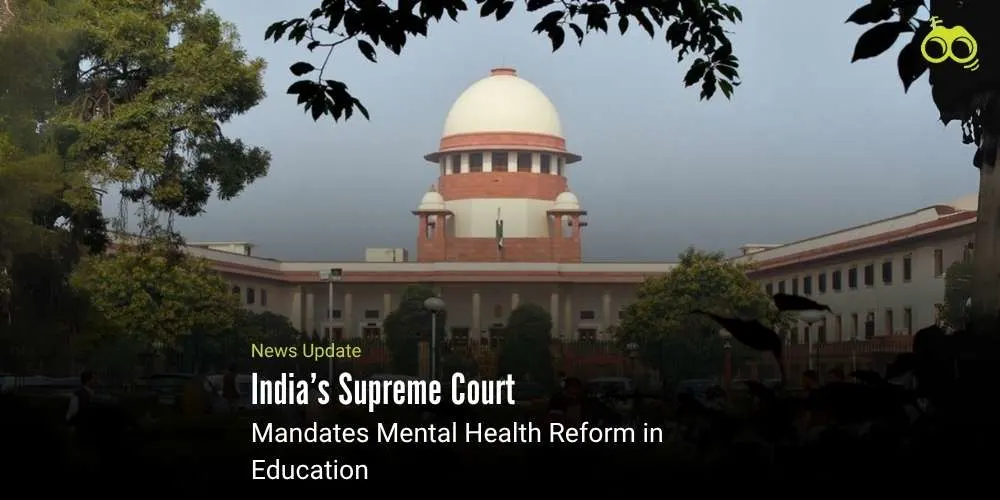Judicial Intervention: SC Enforces Mental Health Safeguards in Schools and Colleges
India’s Apex Court Mandates Mental Health Framework for Educational Institutions
According to data released by the National Crime Records Bureau (NCRB), India recorded 13,044 student suicides in 2022, accounting for 7.6 per cent of all suicide cases nationwide. This figure represents a 64 per cent increase over the past decade, with student suicides rising from 6,654 in 2013 to over 13,000 in 2022. Notably, 2,248 deaths were directly linked to examination failure, underscoring the intense academic pressure faced by students across the country. Mental health professionals have identified a complex web of contributing factors, including toxic competitiveness, social isolation, bullying, family expectations, financial stress, and discrimination based on caste, gender, or socioeconomic background.
In recent years, the Government of India has launched key initiatives to support student mental health. The Ministry of Education’s MANODARPAN programme provides counselling helplines and interactive sessions, while the District Mental Health Programme (DMHP), active in 767 districts, offers suicide prevention and life skills training. The Tele-MANAS helpline (14416) has received over 1.5 million calls, delivering 24/7 support. The Malaviya Mission Teacher Training Programme, held at institutions like the IITs, promotes stress management and emotional resilience. Despite these measures, the Supreme Court has called for a uniform, enforceable framework for all schools, colleges, and coaching centres.
In a landmark move to address the growing mental health crisis among students, the Supreme Court of India has issued fifteen binding guidelines for educational institutions across the country. This judicial intervention comes in response to a disturbing surge in student suicides, which experts have attributed to academic pressure, institutional neglect, and a lack of psychological support. The Court observed that the continued loss of young lives, often due to preventable causes rooted in unattended psychological distress and systemic insensitivity, reflects a national failure that demands urgent redress.
The Court’s guidelines begin with the requirement for all institutions to adopt a common mental health policy, drawing from the Ummeed draft, the Manodarpan initiative, and the National Suicide Prevention Strategy. This policy must be reviewed annually and made publicly accessible. Institutions with more than 100 students are mandated to appoint at least one trained counsellor, psychologist, or social worker, while smaller institutions must establish formal referral links with external professionals. A mentorship framework must be introduced, wherein dedicated mentors or counsellors are assigned to small student batches, particularly during examinations and academic transitions, to provide informal and confidential support.
All teaching and non-teaching staff are required to undergo mental health training twice a year, covering psychological first aid, distress recognition, and referral protocols. Residential institutions must install tamper-proof ceiling fans and restrict access to rooftops and other high-risk areas to prevent impulsive self-harm. Staff must also be trained to engage sensitively with students from marginalised communities, ensuring inclusive and respectful environments. Confidential grievance redressal mechanisms must be established to address bullying, harassment, ragging, and discrimination, with internal committees overseeing these processes. Institutions are directed to conduct regular parental sensitisation sessions to educate families on student mental health and emotional well-being. Anonymised records of student wellness must be maintained, with annual reports submitted to relevant authorities. Suicide prevention infrastructure, including helpline numbers such as Tele-MANAS, must be prominently displayed in hostels, classrooms, and institutional websites. Academic pressure must be regulated, with institutions refraining from performance-based segregation and the imposition of unrealistic academic targets.
To promote holistic development, institutions must integrate sports, arts, and personality-building activities into student life. Mental health literacy, emotional regulation, and life skills must be embedded into the curriculum. The Court has warned that failure to act on mental health concerns may attract legal and regulatory consequences, including contempt proceedings. Furthermore, States and Union Territories are instructed to notify rules within two months for the registration of coaching centres and the protection of students. District-level monitoring committees, chaired by the District Magistrate, are to be established to ensure compliance. The Supreme Court’s intervention marks a turning point in India’s approach to student welfare. While government programmes have laid the foundation, these judicially mandated guidelines offer a structured and enforceable framework to ensure that no student is left unsupported. As institutions prepare to implement these measures, the hope remains that empathy, accountability, and reform will replace silence, stigma, and neglect.
Editor's Note:
The Supreme Court’s new guidelines on student mental health mark an important step in addressing a serious and long-ignored crisis. In 2022 alone, more than 13,000 students died by suicide, many due to exam failure and academic stress. These guidelines are not just helpful; they are urgently needed. They go beyond basic rules and reflect a strong moral duty to care for the mental well-being of students across India. Schools and colleges often neglect mental health, despite its importance. The Court's order for trained counsellors, mentorship, and emotional awareness in classrooms signifies a proactive shift. Guidelines requiring teacher training and inclusive environments address student challenges like competition and discrimination. Moreover, the Court's suggestion for regular parent guidance highlights the need for family support over pressure. Teachers, beyond academics, should recognise mental distress, offer emotional support, and direct students to professional help. Following these steps sincerely can transform schools and colleges into places of safety and support, rather than stress. Integrating arts, sports, and life skills into education is not merely supplementary but essential for holistic development. The Supreme Court has unequivocally stated that inaction will result in legal consequences. However, true success extends beyond mere compliance; it will be achieved when educational institutions cultivate an environment where every student feels genuinely cared for, understood, and valued.
Skoobuzz asserts that we have the choice to either persist in neglecting mental health or to embrace this moment as the catalyst for genuine change.














0 Comments (Please Login To Continue)